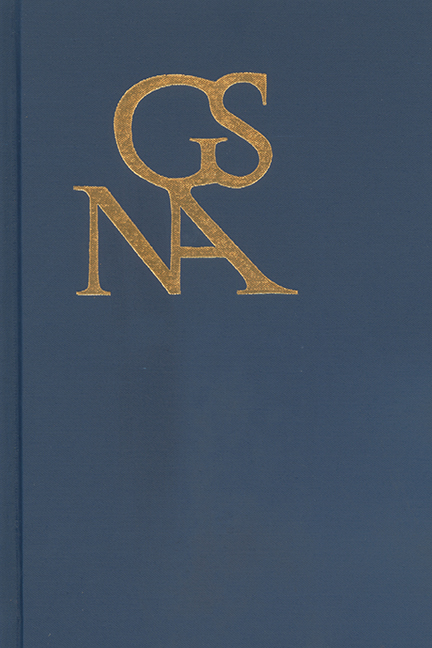Book contents
- Frontmatter
- Contents
- Building Bridges: Goethe's Fairy-Tale Aesthetics
- Goethe as Mystagogue
- Observing Neutrality, circa 1800
- Goethe, Faust, and Motherless Creations
- Impossible Ideals: Reconciling Virginity and Maternity in Goethe's Werther
- Kant, Calculus, Consciousness, and the Mathematical Infinite in Us
- The Classical Aesthetics of Schlegel's Lucinde
- Special Section on Visual Culture in the Goethezeit
- Book Reviews
Kant, Calculus, Consciousness, and the Mathematical Infinite in Us
Published online by Cambridge University Press: 25 February 2017
- Frontmatter
- Contents
- Building Bridges: Goethe's Fairy-Tale Aesthetics
- Goethe as Mystagogue
- Observing Neutrality, circa 1800
- Goethe, Faust, and Motherless Creations
- Impossible Ideals: Reconciling Virginity and Maternity in Goethe's Werther
- Kant, Calculus, Consciousness, and the Mathematical Infinite in Us
- The Classical Aesthetics of Schlegel's Lucinde
- Special Section on Visual Culture in the Goethezeit
- Book Reviews
Summary
Der Begriff des Unendlichkleinen, darauf die Mathematik so öfters hinauskommt, wird mit einer angemaßten Dreistigkeit so geradezu als erdichtet verworfen, anstatt daß man eher vermuten sollte, daß man noch nicht genug davon verstände, um ein Urteil darüber zu fällen. Die Natur selbst scheint gleichwohl nicht undeutliche Beweistümer an die Hand zu geben, daß dieser Begriff sehr wahr sei. Denn wenn es Kräfte gibt, welche eine Zeit hindurch kontinuierlich wirken, um Bewegungen hervorzubringen, wie allem Ansehen nach die Schwere ist, so muß die Kraft, die sie im Anfangsaugenblicke oder in Ruhe ausübt, gegen die, welche sie in einer Zeit mitteilt, unendlich klein sein. Es ist schwer, ich gestehe es, in die Natur dieser Begriffe hineinzudringen; aber diese Schwierigkeit kann allenfalls nur die Behutsamkeit unsicherer Vermutungen, aber nicht entscheidende Aussprüche der Unmöglichkeit rechtfertigen.
[The concept of the infinitely small, which comes up so often in mathematics, is rejected straight out with presumptuous audacity as a fiction, instead of assuming that it is not well enough understood to form a judgment about it. Nature itself seems, however, to provide clear proofs that there is truth to this concept. For if there are forces that work continuously through time in order to produce movements, as it would appear is the case with gravity, then the force that effects this movement in an initial instant (or rest) must be infinitely small as opposed to the one that imparts movement in time. It is difficult, I confess, to penetrate into the nature of these concepts; but this difficulty can at most justify cautiously avoiding unfounded suppositions and not claiming decisively that it is impossible.]
THE QUESTION THAT I ADDRESS in this essay is simple: what is the mathematical infinite doing at crucial moments in Kant's philosophy? By doing I mean the way that specific notions of the infinitely small—the infinitesimal, the differential, infinite approximation, continuity—serve as metaphors in a strong Aristotelian sense; that is, they attempt to “bring before the eyes” something abstract and thereby contribute a kind of intuition to the unintuitable.
And yet, there is something doubly ironic going on in this effort.
- Type
- Chapter
- Information
- Goethe Yearbook 23 , pp. 95 - 122Publisher: Boydell & BrewerPrint publication year: 2016

